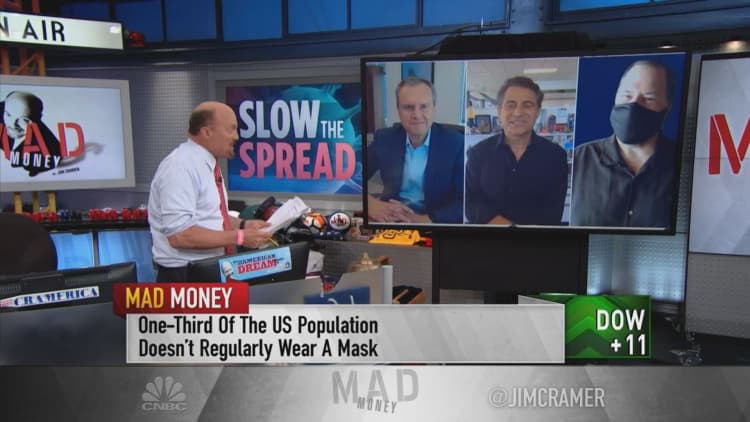With the British government set to make face coverings in English shops mandatory, experts explain why they haven't seen the same widespread uptake as in other countries during the coronavirus pandemic.
Data from market research firm YouGov shows that the U.K. has had among the lowest uptake of people wearing masks in public places throughout the pandemic. The last recorded data found that 38% of Britons said they wear masks in public, versus 88% of people in Spain and 83% in Italy.
The levels in Italy and Spain are around the same as countries in Asia, where mask wearing was already more commonplace before the coronavirus. The YouGov data showed 90% of people in Singapore said they are wearing masks in public, along with 82% in China.
U.K. Health Minister Matt Hancock announced Tuesday that it would become compulsory to wear masks or coverings from July 24. If people don't comply with the new rules they could be fined up to £100, Hancock warned.
Until now the government had only made face coverings compulsory on public transport, which came into effect on June 15. It had also advised people to wear face masks in enclosed spaces where social distancing wasn't possible to help limit the spread of the virus, which has infected over 13.3 million people worldwide and killed 578,628, according to data compiled by Johns Hopkins University.
'Late to the table'
Stephen Reicher, a professor of social psychology at the U.K.'s University of St. Andrews, pointed out that early on in the pandemic Spain and Italy's take-up of wearing masks had been perhaps even lower than in the U.K.
That changed in a matter of weeks because masks were made compulsory, he argued, speaking during a public consultation on Tuesday on face coverings, as part of the U.K.'s independent Scientific Advisory Group for Emergencies.
Reicher added that Italy had also succeeded in increasing usage without the threat of fines, so he didn't believe that the U.K.'s new rules needed to be "accompanied by enforcement, or repression, or fines."
He said there had been fewer people wearing masks in the U.K. as a result of a "lack of a clear leadership and clear guidance."
Susan Michie, a professor of health psychology at University College London, also suggested that a lack of clear messaging could be one reason why masks haven't been more commonplace in the U.K. as in other countries.
She believes that if the government had advised wearing masks in enclosed spaces at the same time as the World Health Organization changed its guidance in June and then followed this up with an effective public information campaign and then mandating, then this would have lead to "high adherence" on transport and in shops.
Instead, Michie told CNBC via email that the U.K. government had been "late to the table," arguing this was also the case with going into lockdown and setting up its "test-trace-isolate" strategy.
Hancock has previously said the government was following the scientific evidence, in defense of it not making mask wearing compulsory.
The U.K.'s department of health had not responded to comment when contacted by CNBC at the time of writing.
Public 'don't know what to believe'
Similarly, Helen Spencer-Oatey, a professor at the University of Warwick's Centre for Applied Linguistics, said repeated comments from officials early on in the pandemic, that masks were not helpful in combating the spread of the virus, had "undermined beliefs about (their) efficacy."
And the gradual change of position meant the public "don't know what to believe."
Spencer-Oatey also pointed out that the U.K. had not experienced a pandemic for generations, unlike in East Asia.
In an article she co-authored in May, Spencer-Oatey referred to the region's experiences of SARS and swine flu in the 2000s, for example, in prompting people to wear masks. In addition, concerns over air pollution following natural disasters and even an increase in hayfever had also triggered greater usage.
Spencer-Oatey also indicated that media campaigns and fashion in East Asia had encouraged mask use.
She therefore said that such norms take time to develop and given that wearing masks could be uncomfortable, "it will take a lot of combined elements to bring about behavioural change."



